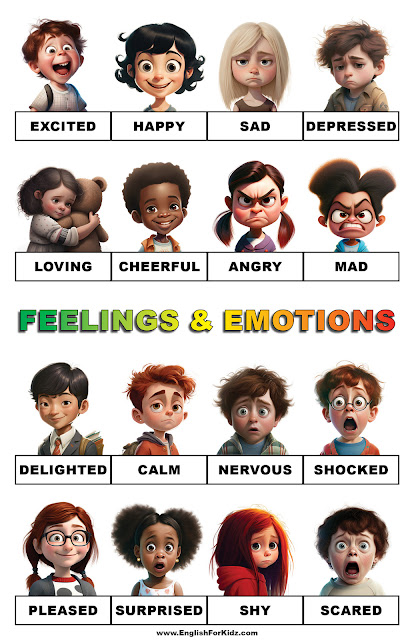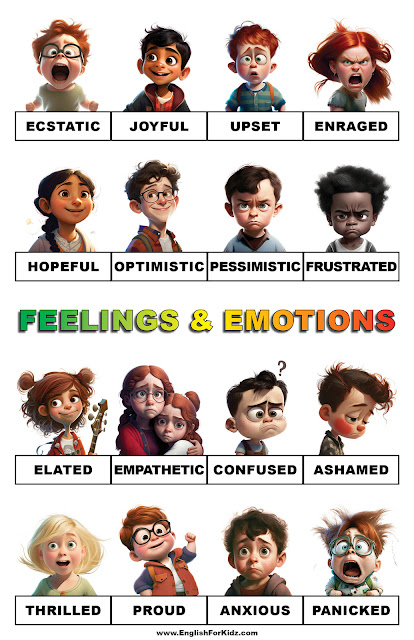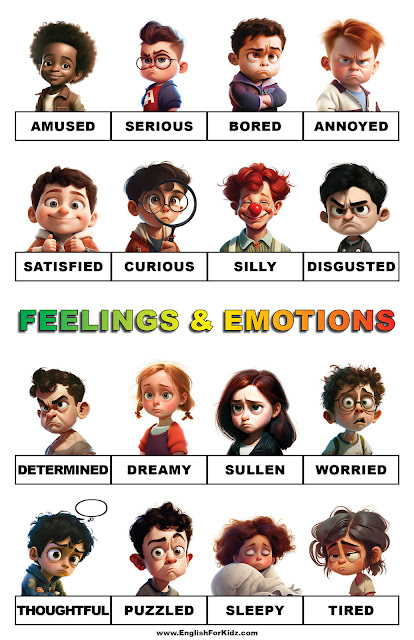I have designed 3 printable posters and a bunch of flashcards to integrate them into my English classes dedicated to feelings, emotions, and mood. The posters and flashcards depict 48 feelings, emotions and states of mind using images of kids that look like Pixar cartoon characters. It’s probably the biggest feelings and emotions chart you can find on printables designed to help EFL and ESL students develop a richer emotional vocabulary.
 |
| My three printable posters visualize 48 feelings and emotions for young English learners. |
These posters and flashcards can serve as a visual representation of vocabulary related to feelings and emotions and thus enhance the students’ learning experience. I use such printables to discuss the topic with my students.
 |
| My printable posters are likely to be the biggest and most child-appealing feelings and emothions chart you can find. |
I ask students to use the posters to show me the emotion they felt recently. These visuals make it easier for kids to learn and understand new English words. They also help students feel more comfortable discussing their feelings and emotions with the teacher and classmates.
The printable posters and flashcards visualize the following feelings, emotions, and mood vocabulary: excited, happy, sad, depressed, loving, cheerful, angry, mad, delighted, calm, nervous, shocked, pleased, surprised, shy, scared, ecstatic, joyful, upset, enraged, hopeful, optimistic, pessimistic, frustrated, elated, empathetic, confused, ashamed, thrilled, proud, anxious, panicked, amused, serious, bored, annoyed, satisfied, curious, silly, disgusted, determined, dreamy, sullen, worried, thoughtful, puzzled, sleepy, tired.
 |
| I use 48 printable flashcards to introduce and reinforce the vocabulary related to feelings and emotions. |
I use the printable flashcards to prompt discussion about different emotions and feelings as well as to introduce new words and reinforce the vocabulary through different activities. The activities may include all kinds of sorting games such as sorting cards by similarity (synonyms) or opposition (antonyms) of emotions, creating a spectrum of emotions based on their intensity, matching pictures to words (the bottom part of a flashcards containing a word can be cut out for this activity). By the way, the flashcards depicting negative feelings and emotions have the red border, the positive feelings flashcards have the green border, and a few flashcards that represent neither good or bad emotions have the orange border.
You can have these feelings & emotions posters and flashcards in your classroom too. You are welcome to purchase them in printer-ready PDF files. The set includes PDF files for printing in four standard sizes: tabloid (11 x 17 inches, 431.8 mm x 279.4 mm) and A3 (11.7 x 16.5 inches, 297 mm x 420 mm) for posters, letter (8.5 x 11 inches, 215.9 by 279.4 mm) and A4 (8.3 x 11.7 inches, 210 x 297 mm) for flashcards (there are 4 flashcards per page). I usually have A3 size sheets printed for me in one of the local print shops. The resolution of an A3-size PDF file is enough to print a poster of the A1 paper format (23.4 x 33.1 inches, 594 x 841 mm). You can see the example of such an A1-size poster in my post dedicated to printable vocabulary posters.


No comments:
Post a Comment